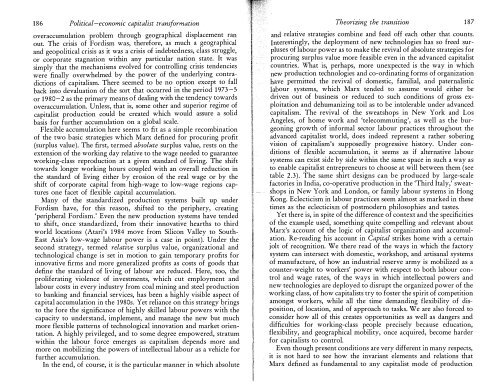The Condition of Postmodernity 13 - autonomous learning
The Condition of Postmodernity 13 - autonomous learning
The Condition of Postmodernity 13 - autonomous learning
You also want an ePaper? Increase the reach of your titles
YUMPU automatically turns print PDFs into web optimized ePapers that Google loves.
186 Political-economic capitalist transformationoveraccumulation problem through geographical displacement ranout. <strong>The</strong> crisis <strong>of</strong> Fordism was, therefore, as much a geographicaland geopolitical crisis as it was a crisis <strong>of</strong> indebtedness, class struggle,or corporate stagnation within any particular nation state. It wassimply that the mechanisms evolved for controlling crisis tendencieswere finally overwhelmed by the power <strong>of</strong> the underlying contradictions<strong>of</strong> capitalism. <strong>The</strong>re seemed to be no option except to fallback into devaluation <strong>of</strong> the sort that occurred in the period 1973-5or 1980-2 as the primary means <strong>of</strong> dealing with the tendency towardsoveraccumulation. Unless, that is, some other and superior regime <strong>of</strong>capitalist production could be created which would assure a solidbasis for further accumulation on a global scale.Flexible accumulation here seems to fit as a simple recombination<strong>of</strong> the two basic strategies which Marx defined for procuring pr<strong>of</strong>it(surplus value). <strong>The</strong> first, termed absolute surplus value, rests on theextension <strong>of</strong> the working day relative to the wage needed to guaranteeworking-class reproduction at a given standard <strong>of</strong> living. <strong>The</strong> shifttowards longer working hours coupled with an overall reduction inthe standard <strong>of</strong> living either by erosion <strong>of</strong> the real wage or by theshift <strong>of</strong> corporate capital from high-wage to low-wage regions capturesone facet <strong>of</strong> flexible capital accumulation.Many <strong>of</strong> the standardized production systems built up underFordism have, for this reason, shifted to the periphery, creating'peripheral Fordism.' Even the new production systems have tendedto shift, once standardized, from their innovative hearths to thirdworld locations (Atari's 1984 move from Silicon Valley to SouthEast Asia's low-wage labour power is a case in point). Under thesecond strategy, termed relative surplus value, organizational andtechnological change is set in motion to gain temporary pr<strong>of</strong>its forinnovative firms and more generalized pr<strong>of</strong>its as costs <strong>of</strong> goods thatdefine the standard <strong>of</strong> living <strong>of</strong> labour are reduced. Here, too, theproliferating violence <strong>of</strong> investments, which cut employment andlabour costs in every industry from coal mining and steel productionto banking and financial services, has been a highly visible aspect <strong>of</strong>capital accumulation in the 1980s. Yet reliance on this strategy bringsto the fore the significance <strong>of</strong> highly skilled labour powers with thecapacity to understand, implement, and manage the new but muchmore flexible patterns <strong>of</strong> technological innovation and market orientation.A highly privileged, and to some degree empowered, stratumwithin the labour force emerges as capitalism depends more andmore on mobilizing the powers <strong>of</strong> intellectual labour as a vehicle forfurther accumulation.In the end, <strong>of</strong> course, it is the particular manner in which absolute<strong>The</strong>orizing the transition 187and relative strategies combine and feed <strong>of</strong>f each other that counts.Interestingly, the deployment <strong>of</strong> new technologies has so freed surpluses? f labour power as to make the revival <strong>of</strong> absolute strategies forprocur ng surplu value more feasible even in the advanced capitalistcountnes. at IS, perhaps, more unexpected is the way in whichnew production technologies and co-ordinating forms <strong>of</strong> organizationhave permitted the revival <strong>of</strong> domestic, familial, and paternalisticlabour systems, which Marx tended to assume would either bedriven out <strong>of</strong> business or reduced to such conditions <strong>of</strong> gross exploitationand dehumanizing toil as to be intolerable under advancedcapitalism. <strong>The</strong> revival <strong>of</strong> the sweatshops in New York and LosAngeles, <strong>of</strong> home work and 'telecommuting', as well as the burgeoninggrowth <strong>of</strong> informal sector labour practices throughout thea? : anced captalst ;vorld, does indeed represent a rather soberingV1SlOn <strong>of</strong> capltaltsm s supposedly progressive history. Under conditions<strong>of</strong> flexible accumulation, it seems as if alternative laboursystems can xis : side by side within the same space in such a way asto enable capltaltst entrepreneurs to choose at will between them (seetable 2.3). <strong>The</strong> same shirt designs can be produced by large-scalefactoris in India, co-operative production in the 'Third Italy,' sweatshopsIII Ne ,; : or and London, .or family labour systems in HongKong. EclecticIsm m labour practIces seem almost as marked in thesetimes as the eclecticism <strong>of</strong> postmodern philosophies and tastes.Yet there is, in spite <strong>of</strong> the difference <strong>of</strong> context and the specificities<strong>of</strong> the example used, something quite compelling and relevant aboutMarx's account <strong>of</strong> the logic <strong>of</strong> capitalist organization and accumulation.Re-reading his account in Capital strikes home with a certainjolt <strong>of</strong> recognition. We there read <strong>of</strong> the ways in which the factorysystem can intersect with domestic, workshop, and artisanal systems<strong>of</strong> manufacture, <strong>of</strong> how an industrial reserve army is mobilized as acounter-weight to workers' power with respect to both labour controland wage rates, <strong>of</strong> the ways in which intellectual powers andnew technologies are deployed to disrupt the organized power <strong>of</strong> theworking class, <strong>of</strong> how capitalists try to foster the spirit <strong>of</strong> competitionamongst workers, while all the time demanding flexibility <strong>of</strong> disposition,<strong>of</strong> location, and <strong>of</strong> approach to tasks. We are also forced toconsider how all <strong>of</strong> this creates opportunities as well as dangers anddifficulties for working-class people precisely because education,flexibility, and geographical mobility, once acquired, become harderfor capitalists to control.Even though present conditions are very different in many respects,it is not hard to see how the invariant elements and relations thatMarx defined as fundamental to any capitalist mode <strong>of</strong> production
















